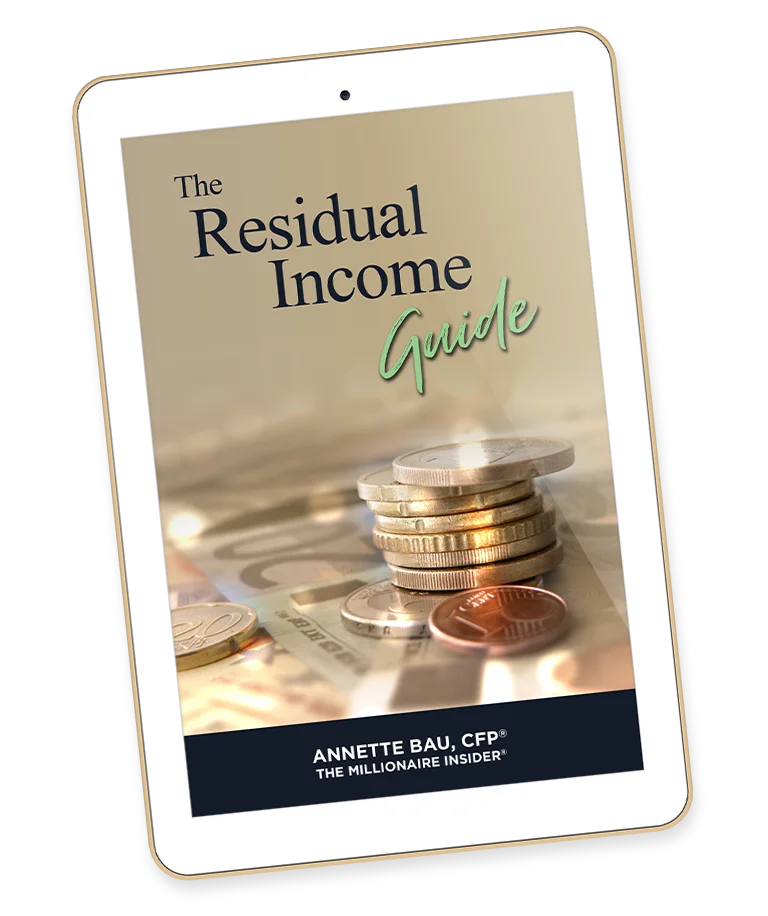Today, we will simplify the questions about annuities. Annuities are a unique investment option offering a steady income stream over varying periods.
In today’s post, “What is an Annuity and How Do They Work?,” you will learn how and when an annuity makes sense. So, let’s dive in and discover the essence of annuities and how they work.
Your Next Step Financial Assessment
If you need help to determine the best next step to secure your financial future and create a retirement you love, click here.
Disclosure
All materials and intellectual property are copyrighted by MillionaireSeries.com®.
This information is for educational purposes only. It is not intended to replace any advisor or specialist or provide investment, financial, tax, retirement, planning, or healthcare advice.
What Is an Annuity and How Do They Work?
An annuity is a contract between you and an insurance company. It is a financial product designed to provide a reliable stream of income. You can purchase an annuity by making a lump-sum payment or a series of payments to the insurance company.
In return, the insurance company promises to make regular payments to you in the future. Think of it as a way to convert a sum of money into a steady paycheck.
Overview of Annuities

While annuities have many nuances, they all operate similarly. The differences arise most prominently in contract details or the different types of annuities.
Annuities function based on a straightforward concept: a person makes a one-time or multiple payments to the insurance company. In exchange, the insurance company pledges to make consistent payments to the person at a future date.
Depending on the annuity selected, these payments can be instant or postponed. Immediate annuities begin paying out shortly after the initial investment, while deferred annuities delay payments until a future date determined by the investor.
The primary types of annuities are fixed, variable, and indexed.
Fixed Annuities
They offer a guaranteed, predetermined payout. Variable Annuities
Variable Annuities
These allow for investment in various underlying assets, with payouts dependent on the performance of those investments. With this type of product, there could be a loss of principal.
Indexed Annuities
An indexed annuity links returns to a specific market index. It typically offers the potential for higher returns and also provides downside protection.
Overall, annuities serve as a tool for retirement planning, offering individuals a way to ensure a reliable income stream for themselves or their beneficiaries over the long term.
Understanding Annuities
Annuities come in various forms and structures, each with its own features and benefits. An annuity generates revenue through a process known as “annuitization.” When you purchase an annuity, the insurance company invests those funds on your behalf (depending on the type of annuity). These investments typically include a mix of stocks, bonds, and cash.
Ultimately, an annuity’s workings revolve around pooling funds and investing them to generate returns. Then, the insurance company distributes some of those returns to the annuitant.
Annuity Terms

Understanding key terms is essential when researching annuities. Here are some important terms to know:
- Premium
The payment made by the annuitant to purchase the annuity. - Accumulation Phase
This is the period during which you make payments into the annuity, and your funds grow through investment earnings. - Distribution Phase
The distribution phase begins when you start receiving payments from the annuity. - Surrender Period
During a specified period, withdrawing funds from the annuity may result in surrender charges or penalties. - Death Benefit
A feature in some annuities that guarantees a minimum payout to the beneficiary upon the death of the annuitant. - Annuitant
The person whose life expectancy is used to calculate the annuity payments. This can be the same person as the annuity owner or a different individual.
Types of Annuities and How They Work
With so many types of annuities available, deciding which is best for your retirement plans can be difficult. Below are some types of annuities and how they may impact you.
If you have questions or need support, click here:

Fixed Annuities
These annuities offer a straightforward and predictable way to generate income in retirement. The insurance company guarantees a fixed rate of return on your investment with a fixed annuity. The fixed rate remains constant for a specified period, typically ranging from five to 10 years.
Pros
- Stability
Fixed annuities offer a stable and predictable income stream, making them suitable for retirees seeking financial security. - Guaranteed Returns
These annuities provide guaranteed returns, protecting your principal investment.
- Tax-Deferred Growth
Earnings grow tax-deferred, allowing your money to compound without the drag of annual taxes.
Cons
- Limited Growth Potential
While fixed annuities offer stability, they may not provide the same growth potential as other investments.
- Surrender Charges
Withdrawing funds before the end of the surrender period may result in surrender charges or penalties.
- Inflation Risk
Fixed annuities may not keep pace with inflation over the long term.
Who can benefit from owning a fixed annuity?
Annuities can be a great option for those looking to supplement their retirement income with a reliable stream of cash.
They are well-suited for those who prioritize stability and are willing to trade potential market gains for guaranteed returns.
Variable Annuities (VAs)

These annuities offer a blend of investment growth potential and retirement income. Unlike fixed annuities, where returns are guaranteed, variable annuities are not.
They allow you to invest your contributions into sub-accounts. These are commonly mutual funds investing in the following types of funds:
- Aggressive growth
- Growth
- Balanced
- Bond
- Money markets
Generally, it does not make sense to invest a variable annuity into fixed assets, including bonds and money markets, because of the internal costs.
The performance of these investments is reflected in the value of your annuity, meaning your returns can fluctuate based on market performance.
Pros
- Potential for Higher Returns
Variable annuities offer the potential for higher returns and higher risk. A VA’s investment performance is tied to the performance of underlying investment accounts.
- Investment Flexibility
Variable annuities allow you to allocate your contributions among various investment options, providing flexibility to tailor your portfolio to your risk tolerance.
your contributions among various investment options, providing flexibility to tailor your portfolio to your risk tolerance.
- Optional Features
Variable annuities often offer several optional features. These options are known as riders. They can provide additional benefits, such as guaranteed minimum income, death benefits, or protection against market downturns.
Cons
- Market Risk
The performance of variable annuities is subject to market fluctuations. This means your investment value can decline if the underlying investments perform poorly and you could lose money.
- Fees and Expenses
They typically come with higher fees and expenses than other investments.
- Complexity
With a variety of investment options and features, they can be challenging for some investors to use effectively.
Who can benefit from owning a variable annuity?
These annuities may appeal to investors comfortable with market risk and seeking higher investment returns. In addition, they are also appropriate for investors who value the flexibility to customize their investment portfolio. Generally, younger investors with a longer time horizon are good candidates.
Indexed Annuities

These annuities offer a combination of growth potential and downside protection. Indexed annuities provide returns linked to the performance of an underlying stock market index, such as the S&P 500. They also offer a minimum guaranteed interest rate.
Pros
- Growth Potential
Index annuities offer the potential for higher returns compared to traditional fixed annuities.
- Downside Protection
They provide downside protection, ensuring your principal is preserved, even if the index performs poorly.
- Guaranteed Minimum Interest Rate
Indexed annuities typically come with a guaranteed minimum interest rate.
Cons
- Limited Returns
While they offer the potential for higher returns, your earnings may be capped by participation rates or other limitations.
- Long-Term Commitment
Indexed annuities typically come with longer surrender periods, making them less liquid than other investment options.
- Complexity
Indexed annuities can be complex financial products with various participation rates, caps, and indexing strategies to understand.
Who can benefit from owning an index annuity?
Indexed annuities may be suitable for investors seeking a balance between growth potential and downside protection. They can appeal to those who want to participate in the stock market while safeguarding their principal.
Immediate Annuities
These annuities offer a lifetime stream of guaranteed income. They can pay for a period of time, such as ten years, life, or a 20-year life (A 20-year life pays for the annuitant’s life and a minimum of 20 years.).
You make a one-time lump-sum payment to an insurance company, and the insurer guarantees to pay you a specified amount of income.
to pay you a specified amount of income.
Pros
- Steady Income Stream
Immediate annuities offer a reliable stream of income that begins immediately, providing peace of mind.
- Lifetime Income
They can provide income payments for the rest of your life, protecting against the risk of outliving your savings.
- No Market Risk
Immediate annuities provide fixed payments, so you’re shielded from market volatility and fluctuations in interest rates.
Cons
- Inflexibility
Once you purchase an immediate annuity, you’re locked into the chosen payout option and cannot adjust the payment schedule.
- Inflation Risk
Immediate annuities may not keep pace with inflation over time, reducing your purchasing power, especially if you opt for a fixed payment amount without inflation protection.
Who can benefit from owning an immediate annuity?
They can be valuable tools for retirees looking to secure a reliable income stream to cover essential expenses in retirement. In addition, they can be particularly suitable for individuals who prioritize financial stability and are afraid of outpacing their social security income.
Tax Deferred Annuity

Deferred annuities have income payments that are deferred until a later date, typically during retirement. With a deferred annuity, the insurance company invests your contributions, allowing them to grow tax-deferred.
Pros
- Tax-Deferred Growth
Deferred annuities offer tax-deferred growth, allowing your contributions to grow without immediate tax consequences.
- Flexible Start Date
They also provide flexibility in choosing when to start receiving income payments. This allows you to better tailor the income payments to your retirement plan.
Cons
- Market Risk
Your investment returns may be subject to market fluctuations depending on the type of deferred annuity you choose.
- Complexity
Deferred annuities can be complex financial products, making it difficult for a person to determine the best option.
Who can benefit from owning a tax-deferred annuity?
Deferred annuities can be a valuable tool. They allow you to accumulate money for retirement and ultimately provide a reliable source of lifetime income.
They are particularly suitable for individuals who have maximized contributions to other retirement accounts, such as 401(k)s or IRAs.
Additional Tips
- Assess your situation
- Identify your short and long-range goals
- Determine your cash flow needs
- Create a plan
- Determine your risk level
- Consider tax ramifications
- Consult with a qualified insurance agent or financial advisor
Always consult with an advisor before beginning an investment plan.
Recap – “What is an Annuity and How Does It Work?”
To recap, there are a lot of choices and considerations when purchasing an annuity.
And they offer a wide range of options for individuals seeking to secure their financial future.
Whether you prioritize stability and guaranteed returns or seek the potential of higher growth and flexibility, there is an option for everyone.
Always check with a qualified investment professional before you purchase an annuity or any investment.
Click here to get your free financial checkup:
Thank you for accessing
“What is an Annuity, and How Does It Work?”
All international copyrights are reserved.

